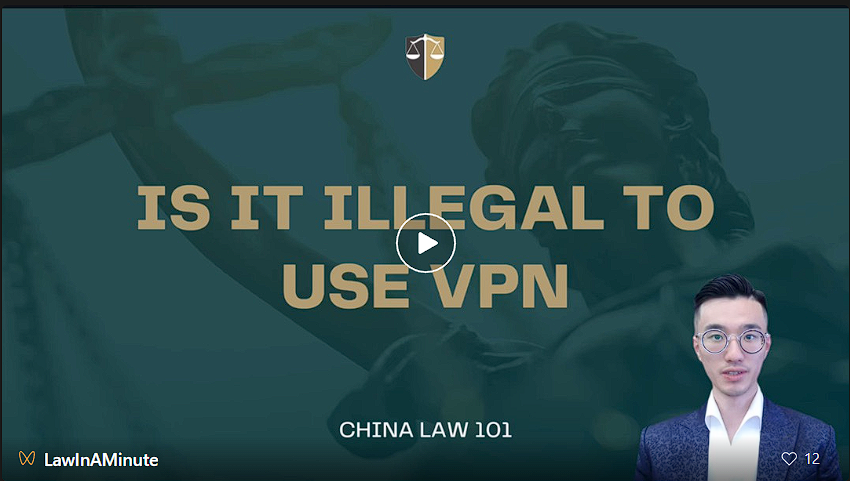·About The Author·

- Author of Chinese Law Books: Intellectual Property, Commercial, Company and Economic Law In A Minute
- Author of English Law Book Business Law In A Minute
- Co-Author of Peking University Textbook: Business Ethics
- Graduated from Fudan University Law School
- Interviewed by Bloomberg and Timeout
- Mentor at Bloom Education (Charity)
Wechat: lawinamin
Email:[email protected]
When we use devices to access the internet, the devices first connect to an ISP, which provides access to the internet. ISP stands for Internet Service Provider, which serves as the gateway and bridge for end users to access the internet. Currently, in China, it mainly refers to the three major telecommunications operators: China Telecom, China Mobile, and China Unicom.
In general, when our devices connect to internet sites through an ISP, they directly connect to the destination site's server, which then sends the information back. There are risks of network attacks during the transmission of information. Network attacks can filter, delete, or even shut down websites, preventing the destination site's server from transmitting information back. There are various methods of network attacks, with common ones including IP address blocking, content filtering, domain hijacking, and traffic restrictions. This is the principle behind the work of "firewall" network content filtering.
In China, the so-called "firewall" refers to the national public network monitoring system, which is a general term for multiple network inspection systems established by the Chinese government within its jurisdiction on the Internet.
Virtual Private Network (VPN) is a technology developed to address the security, confidentiality, reliability, and stability of network data transmission. It can establish a secure virtual private network on the public network, providing users with a low-cost, efficient, and secure channel for sharing and transmitting data resources. It can solve the problems of traditional enterprise network configuration for remote communication hardware and high maintenance costs.

The term "climbing over the wall" refers to bypassing the "firewall," which means bypassing IP blocking, content filtering, and other network attacks to access the target server and obtain information effectively.
"Climbing over the wall" does not equal VPN. It is just that VPN can establish a secure communication tunnel between the device and the target server. By encrypting data and altering the target address of the data, it prevents information from being attacked, and it also bypasses the network inspection of the "firewall," achieving "climbing over the wall."
Due to the high cost of cross-border dedicated lines and related VPN services provided by the three major operators, and the low production cost, affordability, and ease of installation of illegal VPN software, it is quite common in practice to use such VPN software to browse restricted overseas network content within the country.
According to Article 12 of the "Administrative Measures for the Protection and Management of International Internet Security in Computer Information Networks," Internet units, access units, legal persons, or other organizations using computer information networks for international internet access shall, within 30 days from the official connection to the network, go to the designated acceptance authority of the people's government of the province, autonomous region, or municipality directly under the Central Government to complete the filing procedures and promptly report changes in the access units and users.

In recent years, based on cases in China, using VPN alone is not illegal, and in principle, it is not punished. However, it must be a VPN constructed and registered by relevant entities. The act of individuals using VPN for browsing is not illegal in itself. If the VPN software is not registered, it may inadvertently expose computer information and other data. According to the "Interim Provisions on the Administration of the International Networking of Computer Information Networks of the People's Republic of China", public security organs may classify the behavior of individuals installing and using "VPN" software to access foreign websites as "unauthorized establishment and use of illegal channels for international networking" or "illegal access to international networks" and may impose administrative penalties. However, if individuals use VPN to make related illegal statements or engage in illegal activities, or if companies use unregistered VPNs, they may be involved in illegal crimes.
According to the latest regulations of the Chinese Ministry of Public Security, illegal criminal activities related to the production, sale, and large-scale provision of "climbing over the wall" tools will be targeted, and administrative penalties will be imposed according to specific cases based on the provisions of the "Cybersecurity Law" Article 21, Article 59, and other laws and regulations. For those suspected of crimes, criminal responsibility will be pursued for offenses such as failure to fulfill obligations related to the management of information network security. Based on recent criminal cases related to cracking down on the production and sale of VPNs, there are mainly three types of convictions and penalties:
First, the crime of failing to fulfill obligations related to the management of information network security. For example, in the case of Zhu's refusal to fulfill obligations related to the management of information network security, the defendant Zhu registered and established a company, created multiple websites to promote the VPN software he developed and sold it on his own. Later, Zhu rented domestic and foreign servers to establish his VPN platform and sold access to it online. Even after receiving a notice from the public security bureau to cease his illegal activities, Zhu continued to operate the VPN platform. The court sentenced Zhu to imprisonment for two years and imposed a fine.
Second, the crime of providing tools for the unauthorized access to computer information systems. In another case, the defendant Li developed and sold VPN software that allowed users to bypass the "firewall" and access blocked foreign websites. Li's software was used by a large number of individuals in China. The court found Li guilty of providing tools for unauthorized access to computer information systems and sentenced him to imprisonment for three years and imposed a fine.
Third, the crime of illegal business operations. In a case involving the sale of VPN services, the defendant Wang operated a company that provided VPN services to individuals in China. The court determined that Wang's business operations were illegal and sentenced him to imprisonment for two years and imposed a fine.


